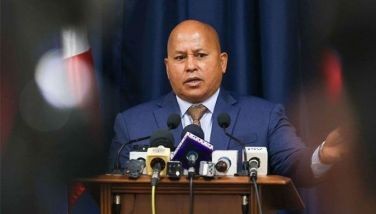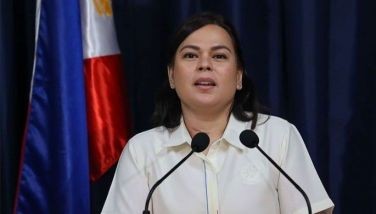Noy signs P2-trillion budget for 2013
MANILA, Philippines - President Aquino signed yesterday the P2.006-trillion budget for 2013 that aims to empower people through better social services and pump up the economy to sustain growth before the ban on spending takes effect due to the elections in May.
Aquino said there were five guiding principles to be followed in the use of the budget to eliminate leakages and adhere to the administration’s “there are no poor if there are no corrupt” slogan.
Budget Secretary Florencio Abad said during the first week of the year, the government would roll out the public-private partnership (PPP) projects and other infrastructure programs with a total capital outlay of about P400 billion.
“With the start of the implementation of many PPPs and the frantic spending that will accompany the 2013 May elections, it’s going to be a robust first semester,” Abad said.
He said the ban on spending will begin on March 29, but the pre-procurement activities that happened this year would give the administration time to complete them.
“Many of these projects can exceed or even be completed before the election ban. Many of the PPP projects are private, non-government projects that can proceed and we should be able to ask for exemption for some of the national infrastructure projects,” he said.
The budget chief said they could see a stronger fourth quarter growth because they had been able to deal with the bottlenecks and the stumbling blocks to project implementation. He said the government was able to frontload projects for 2013 like roads, tourism and flood control.
This was the third consecutive year that the budget was signed on time instead of getting reenacted.
Present during the signing were Senators Franklin Drilon and Edgardo Angara, House Speaker Feliciano Belmonte Jr., Executive Secretary Paquito Ochoa Jr., Budget Secretary Abad, Deputy Speakers Pablo Garcia and Lorenzo Ta?ada III, Majority Leader Neptali Gonzales II and 1st District Negros Oriental Rep. Jocelyn Limkaichong.
Aquino said the budget is a fulfillment of his promise to use the national coffers to improve the people’s lives. He thanked Congress leaders, including Senate President Juan Ponce Enrile, who was not present during the ceremony, and Belmonte for the passage of the budget bill on time.
“Preferably this year,” he said as he thanked the Congress for passing the bills.
Presidential Communications Development and Strategic Planning Office Secretary Ricky Carandang said the budget for the implementation of programs related to RH and responsible parenthood were already included in the 2013 budget.
However, Carandang said he was not aware as to how much was allocated for the program. He said those opposed to the RH bill have “every right to go to court” and they would respect their right to air their views.
“I think before the end of the week we might have a good chance of having another signing ceremony. The President said that this morning, that there’s a legislation that has been passed already by Congress awaiting his signature, and he’s hoping that they can get that done before the end of the year,” he said.
The President said the budget for 2013 was designed to be an “instrument to bring back to the people the power to determine their own fate.”
Aquino did not veto any item in the budget and committed to an accelerated pace in spending to sustain or even improve economic growth.
He said when the budget was presented after his State of the Nation Address in July, the five principles of empowerment were included.
He said bigger allocations go to education, health, climate change and job-generating projects, and the principle of zero-based budgeting allowed the government to invest in social and economic services.
The President said more than 60 percent of the national budget would be allocated to these two sectors.
The second principle, he said, was the acceleration in the implementation of priority projects and programs with the Department of Public Works and Highways (DPWH) as principal infrastructure agency, and a performance monitoring system in place. He said the target spending for education, health, agriculture, conditional cash transfers, tourism and other sectors would hopefully be reached through the system. Aquino said the other principles involved accountability, empowerment and people-oriented, and there were no more lump sum items in the budget as all allocations were properly identified.
He said new technology would be used to eliminate the process of repeated submission of documents before the budget is released.
- Latest
- Trending






























